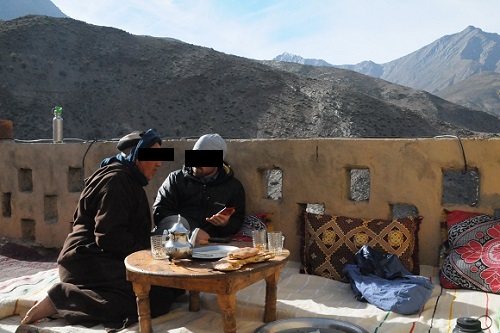
A Climbing For Christ member disciples a Muslim background believer in the Atlas Mountains. (Photo by Gary Fallesen)
The differences between Christianity and Islam are massive and many. There are huge points of division upon which both religions completely conflict.
Still there are many who say that Christians and Muslims (and perhaps followers of any and every other religion) worship the same god.
That simply cannot be true. There are far too many critical positions that are polar opposite to one another, and each religion holds firmly to its respective position.
For example, for Project Prayer: Ramadan 2016, I wrote about the difference between the Christian concept of the Trinity and the Islamic concept of Tawhid.
One example of a doctrinal blockade between Islamic and Christian beliefs is the Muslim concept of “tawhid.” This belief refers to the oneness of Allah and his transcendence over all things as the indivisible Deity. He is totally and completely singular in every sense. His absolute unity is never to be shared. In fact, doing so is one of the most grievous sins in Islam known as “shirk,” which comes from Arabic, meaning “to share.” In other words, Allah will not grant his divinity to any partner. To the Christian, however, there is one triune God manifested in three distinct persons: Father, Son and Spirit. This poses an obvious difficulty in presenting the Triune God of Christianity. Even more so, it raises a huge barrier to a Muslim coming to Christ. To acknowledge Jesus as the divine Son of God is not only apostasy – which carries its own consequences – it is “shirk;” a sin that is unforgivable unless repented of before death.
The stark disagreement between the Trinity and the Tawhid is just one example of a huge difference between the beliefs of Christians and Muslims.
Islam also teaches that when Jesus (Isa) returns He will judge the Christians for believing that He died. In fact, one Hadith by Sahih al-Bukhari declares that “the Hour [Return of Jesus] will not be established until the son of Mary [Jesus] descends amongst you as a just ruler, he will break the cross...” Jesus is said to break the cross to demonstrate that, as the Qur’an proclaims, “they did not kill him, nor did they crucify him” (see Surah 4:157). Clearly, these few examples demonstrate that the Qur’an does not teach that both religions are the same.
The Bible, too, plainly declares the division between Christianity and Islam. “But even if we, or an angel from heaven,” Paul warned in Galatians 1:8, “preach any other gospel to you other than that what we have preached to you, let him be accursed.” Without a doubt, Islam, with its denial of the death and deity of Jesus and works based salvation is to be considered “another gospel” (in spite of the few stories and concepts Muhammed lifted from the “people of the book,” or Christians, of his day).
Regardless of the barriers blocking Muslims from coming to Christ, there are bridges that we can use to lead followers of Islam on a path to becoming followers of Jesus.
We can – and must – learn about their beliefs, meet them where they are, and gradually help them gain an understanding of the true Gospel message. One way this is possible, which has proven to be very successful among numerous mission organizations serving Muslim people, is to start with the few flickers of truth found within the Qur’an.
No, the Qur’an is not an inspired book. Yet in spite of numerous misrepresentations of Jesus, it does contain several incredible truths about Jesus (Isa). We can point our Muslim friends to these truths and then, over time, lead the conversation to the full truth of Jesus as the Son of God who gave His life for the salvation of the world.
In the coming days, we’ll take a look at some of these bridges in the hope that God would use us to point our lost Muslim neighbors to Jesus.